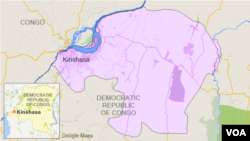Human Rights Watch said at least 175 people, and probably many more, have been kidnapped in the Democratic Republic of Congo this year, and the rights group has called for a special police unit to track kidnappers and investigate allegations of complicity by state agents.
Human Rights Watch said armed groups or former members of armed groups appear to have been responsible in many cases.
Victims were usually released after ransoms had been paid.
HRW said it was told by an official the leader of one kidnapping gang "could have been working with people in the military."
Allegations against military
That gang leader was put on trial in April, but his allegations of soldiers’ complicity do not seem to have led to any judicial inquiry, and no other kidnappers have been tried since.
VOA spoke to a kidnap victim, aid worker Amboko Kitungiro, who was abducted last month along with 13 colleagues by about a dozen heavily armed men.
“It was an ordeal,” Kitungiro said. The kidnappers marched their victims through the forest from midday until 10:30 p.m.
He said the next day the kidnappers, who claimed to be from the Rwandan rebel FDLR group, took the exhausted aid workers, who were nothing to eat or drink, back to a road and released them.
“A few minutes after we were released, we met some government soldiers," Kitungiro said. "They asked us where have you come from? We told them we had been kidnapped, and they said, ‘Really? We were looking for you.' "
The Congolese army reported its soldiers pursued these kidnappers and freed the hostages.
Disputes army version
But Kitungiro said there was no pursuit and no shooting, even though the victims told the soldiers the kidnappers were just a few meters away.
Asked if the soldiers’ appearance at the moment of their release had been a coincidence, he said he could not comment.
Local sources said a ransom was paid for the aid workers.
U.N. mission spokesman Felix Basse told VOA the number of kidnappings has gone down since the United Nations and the Congolese army agreed on an anti-kidnapping strategy.
One of the problems, Basse said, is that people are often tempted to pay ransoms, which does not help to reduce kidnapping.
According to HRW, at least four of kidnap victims this year were killed and another has disappeared.




